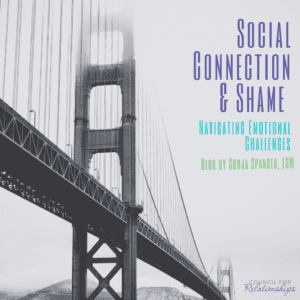Social Connection & Shame: Navigating Emotional Challenges
I once heard humans described as “exquisitely social” creatures. We have a remarkable ability to pay close attention to the people around us. While engaging in conversation, another part of our brain manages how others see us, ensuring we are acceptable in their eyes. Social connection plays a crucial role in this dynamic.
The Role of Social Connection in Human Behavior
Our ancestors relied on fellow group members for mutual aid required for survival and reproduction. To be positively valued by fellow group members meant higher levels of assistance, whereas to be an outcast from the group meant a literal threat to life.
Unsurprisingly, our brains sometimes process perceived social inadequacies as a threat to our existence. For some of us, this manifests through the burn of shame and self-criticism. Because social connection is so important to us, shame can be a form of grief as we experience the loss of potential attachment. In the moment, though, shame does not feel like grief. It feels like self-hatred. It can hurt so badly that we try to avoid it at all costs.
Despite the emotional suffering that shame can cause, it is not inherently bad. Shame can foster or sever social connections depending on how we use it.
Differentiating Between Shame and Guilt in Social Connections
When defining shame, it can be helpful to compare it to guilt. If there is a perceived error in a social setting, guilt will tell you, “I did a bad thing.” Shame, however, will tell you, “I am bad.” If you are experiencing guilt, it can be easy to use the feeling to address the mistake, learn a lesson, and make amends. However, if you believe some inherent flaw within yourself caused the mistake, that’s much harder to “fix.”
Behavioral Responses to Shame in Social Interactions
Because shame feels so hard to fix, people will instead build a protective layer around it. They will engage in behaviors that keep others from seeing their flawed self. This can manifest in different ways. Some people will use “people-pleasing” as a way to appease others and keep things harmonious. Other people will use achievement and winning as a way to attain status that is admirable to others. Internally, many people try to protect their shame by ruminating on their bad qualities, over-focusing on themselves during social interactions, or completely withdrawing from others.
These behaviors are all there in an effort to protect you from feeling shame in social settings. Unfortunately, sometimes they can have the opposite effect – they reinforce the shame by causing you to be less present and authentic with the people around you. Ironically, the shame itself does not cause problems, but how you try to protect yourself against it does. As with many therapeutic interventions, the path toward healing is to pierce through the protective layer and address the shame directly. Here are a few methods to help you get there.
The Path to Healing: Removing Judgment from Shame in Social Connections
Your first step is to remove judgment from the shame. If we don’t see shame as “bad,” there will be less need to hide it from others. In fact, evidence shows that shame can be quite functional in social settings. For example, if there is conflict in a relationship, the injured party is more willing to forgive when the perpetrator expresses shame rather than guilt, as it shows “true sorriness.”
Because the sincerity involved in expressing shame not only facilitates forgiveness but also builds trust. This goes beyond merely apologizing for social transgressions—there is humility wrapped up in the general expression of shame that others find approachable, trustworthy, and relatable. Try to consider these perspectives on shame as a means for social connection rather than something to be ashamed of.
Practicing Vulnerability and Building Trust in Social Connections
To practice being more open with your shame, pick a safe relationship. Therapy is an excellent place to do this. Many of us experience shame with our therapists just as with any other relationship. Pay attention to where it comes up for you.
For example, do you sometimes feel judged by your therapist? Do you try to please your therapist or impress them in some way? Do you hide or minimize certain parts of yourself? Do you leave your sessions feeling critical of yourself or your therapist? Be open about these things with your therapist as much as possible.
Being more communicative about these types of vulnerabilities creates the space for clarity, empathy, and mutual understanding that can be applied to outside relationships.
You must have the courage to risk admitting your shame to others. Of course, your shame convinces you that the “bad” parts of yourself are unlovable and, therefore, you will be shunned if you expose them to others. In some cases, this might be true. In others, you might be accepted and loved even with the “bad” parts of yourself. To take that risk means to open yourself up to the possibility of attaining social connection in its deepest form – unconditional love.
The Role of Self-Compassion and Common Humanity in Social Connections
It is important to address shame in our relationships with others, but it is also important to remedy one’s own relationship towards their shame. We must take that unconditional love we desire from others and turn it inwards. If unconditional love feels unrealistic, aim toward neutrality, acceptance, or compassion.
Try noting the self-critical messages your shame tells you and reading them out loud to a loved one. When you read them out loud, what do you feel? Do you feel sadness, empathy, compassion? Don’t forget that when your self-critic tells you you’re not good enough, another part of you has to hear that. Can you access some empathy for that part of you?
One component of Kristen Neff’s theory on self-compassion is that of “common humanity,” which posits that we all suffer from feelings of inadequacy. All of us experience our own versions of shame. Which is to say: you are not alone. To be more open with and compassionate towards your shame is to give yourself and others permission to be flawed with each other.

CFR Staff Therapist Sonja Spangler, LSW
About Philadelphia Therapist Sonja Spangler, LSW
Sonja Spangler, LSW, is a Staff Therapist at the Council for Relationships who sees individuals, couples, and families in Philadelphia, Paoli, PA, and online. Contact her to book an appointment.
Are you struggling with feeling guilty? Let CFR’s over 85 individual, couples, and family therapy experts help you build social connections, navigate shame, and embrace being yourself in group settings. See our Therapist & Psychiatrist Directory for CFR therapists or psychiatrists near you.
If this is an emergency, please call 911 or contact the National Suicide Prevention Lifeline by dialing 988.
More Mental Health Blogs from CFR
CFR’s therapists, psychiatrists, and other mental health professionals offer much more to explore! Check out the CFR Expert Voices blog for great mental and emotional health advice on managing negative emotions, improving interpersonal relationships, building healthy relationships with family members, and so much more. To get first access to our Expert Voices blog, join our mailing list!

